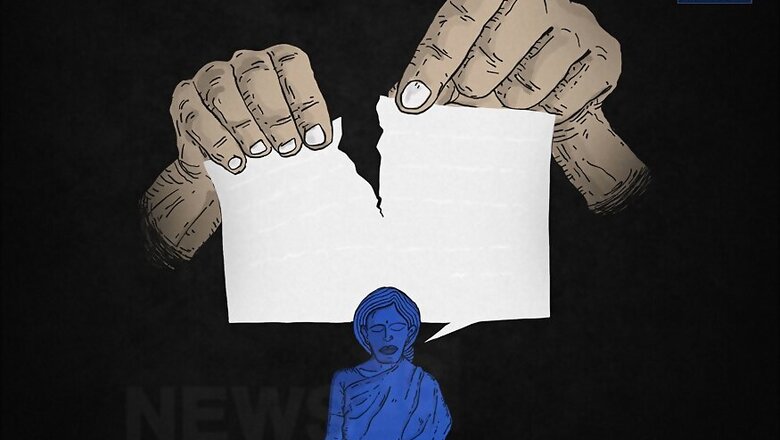
views
The Ministry of Information and Broadcasting issued an order on August 7, urging media to refrain from using the word ‘Dalit’ and use the constitutional term ‘Scheduled Castes’ instead. Several Dalit writers, academicians and activists have criticised the advisory and cited the term’s political and cultural significance.
In June, the Bombay High Court had heard a Public Interest Litigation filed by Pankaj Meshram, seeking removal of the word ‘Dalit’ from all government documents and communication. It had then asked the Ministry to consider issuing a circular to the media to stop using the word. The August 7 advisory to the media cited the High Court order. The word ‘Dalit’, however, has a political and cultural history.
“The term was first used in 1932 when the Poona Pact was signed. It refers to the oppressed. It refers to those who have been suppressed by the upper caste,” said Sukhdeo Thorat, prominent economist, academician and writer. His books include ‘Dalits in India: Search for a Common Destiny.’
The Poona Pact was an agreement between BR Ambedkar and M.K. Gandhi on the reservation of electoral seats for the depressed classes (the term used for marginalised classes during the British Raj).
“The official terminology, Scheduled Caste, is used so that those who come under it benefit from the policies of the government. It is used for official purposes and documentation. However, there are oppressed castes that do not come under Scheduled Castes. It is a legally defined category, but the media and academicians can use other words, to capture the context and the problems faced by the communities,” Thorat said.
According to him, ‘Dalit’ itself is a rich word. “It comes from Marathi. It means the oppressed, the resourceless. The word became politically prominent in 1972 when the Dalit Panthers were set up. Over the years, it became a broader concept and represented those who were oppressed on the basis of their caste on economic, cultural and political grounds,” he said.
The term has been mostly used to describe the communities who have been subjected to untouchability.
“The word means oppressed, it doesn’t mean untouchable. It did not mean untouchable. Dalit Panther gave political weight to the word, a sense of identity, but it got attached to untouchable,” said Chandra Bhan Prasad, a Dalit writer, journalist and political commentator.
Dalit academician Badri Narayan also echoes Thorat’s sentiments. “’Scheduled Castes’ is a neutral word. But ‘Dalit’ constructs a cultural and political context. It’s a lively word. It represents that struggle,” he said.
However, Narendra Jadhav, writer, economist, public policy expert and incumbent member of Rajya Sabha, pointed to a less than glorious origin of word. “I think it comes from the word ‘pad-dalit’, which means downtrodden. Jisko pairon ke tale kuchla gaya hai,” he said. “Dr. Ambedkar never used that word and I don’t think he would have liked to use that word.
“Maybe Dalits also don’t like the usage of the word too. Many so-called Dalits don’t like to be called Dalits. So I am not against the advisory,” he added.
Narayan also said the usage of the term is debatable within the community as well. “Many do not want to be called Dalit. But they also don’t want to be called Scheduled Caste. They want to be referred by their respective caste,” he said.
Over the years, alternative terminologies have also come and later fallen into disuse. Harijan, a word popularized by M.K. Gandhi is considered offensive and derogatory.
“Any self-respecting person belonging to the Scheduled Castes hates that word. The false compassion is very patronising. We dislike it immensely. It shows condescension on part of the others. Dr Ambedkar had also said, we don’t want your compassion, we want our rights,” Jadhav said.
According to him, Bhaurao Krishnaji Gaikwad a politician and founding member of Republican Party of India had objected the use of the term ‘Harijan’ in a 1937 Mumbai legislative council meeting. “He had said if we are sons of god (Harijan), are the rest sons of devil?”
Narayan mentioned that Mayawati, president of Bahujan Samaj Party (BSP), has also spoken against the term ‘Harijan’ in the past. “Kanshi Ram did not use the word ‘Dalit’ much. He used Bahujan, which is a broader term,” Narayan said. According to him, the Ministry’s order will shrink the boundaries of the word ‘Dalit’.
Prasad said the official term ‘Scheduled Castes’ has been inherited from the British. “The word ‘Dalit’ has been embraced by Dalits themselves. And to understand it, one must understand Dalit Panthers."
Prasad stated that the advisory to refrain from using the term is an attack on rising Dalit assertion. “Dalits have become a single caste now, they are united and they are making their social power known. The caste supremacists they have problem with that assertion, and so the government wants to weaken it,” he said.
Thorat said the identity of the people remained the same, even if terminologies to refer their communities changed over the years. “It is like in America. The word ‘negro’ was changed to ‘black’. Now, it is ‘African American’. But the stigma remains,” he said.















Comments
0 comment